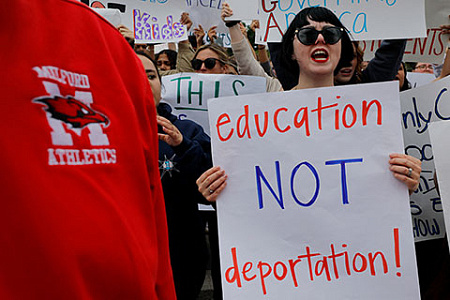
The U.S. State Department, under the Trump administration, has intensified its scrutiny of international students, revoking over 6,000 visas for a wide spectrum of offenses. This crackdown reflects a significant policy shift, impacting everything from criminal behavior to political expression and affecting a large portion of the 1.1 million foreign students currently studying in the United States.
The reasons for visa cancellations are diverse. Approximately 4,000 visas were annulled for infractions such as drunk driving and theft. However, the administration has also targeted students for their political activities. Notably, around 300 visas were revoked for what authorities labeled “aiding terrorism,” a charge largely directed at students who participated in pro-Palestinian demonstrations during clashes between Israel and Hamas.
For most students found in violation, the consequence has been deportation and a ban on re-entering the U.S. for several years, rather than criminal prosecution. The State Department has described expulsion as an effective and humane measure. This tough stance was articulated by Senator Marco Rubio, who remarked, “A student visa is a privilege, not a right. If you don’t like it, go home.” This highlights the administration’s view that foreign students must strictly adhere to American laws and norms.
Prestigious institutions like Harvard and Columbia University have found themselves at the center of this new environment, losing hundreds of millions in federal subsidies. Columbia University recently agreed to a $200 million settlement related to its students’ and faculty’s involvement in anti-Israel protests. In exchange for acknowledging wrongdoing, the university’s access to $400 million in government grants was restored, but with a new stipulation: it must now vet foreign student applicants based on their alignment with the administration’s foreign policy objectives.
New, stricter regulations have been implemented across the board. The Department of Homeland Security now requires student visa applicants to grant access to their social media accounts, which are forbidden to be held under pseudonyms. Furthermore, students risk expulsion for publishing articles critical of White House policy in campus media. These policies have reportedly caused an estimated 10,000 to 12,000 prospective students to choose universities in Europe and Canada over the United States.
Despite these deterrents, the appeal of a U.S. education remains strong, with consulates abroad issuing over 400,000 new student visas annually. International students, the majority of whom come from China, India, and South Korea, provide a substantial financial boon to the U.S. economy and university budgets, with tuition at institutions like Harvard costing nearly $50,000 per semester. This economic reality has led administrators, especially from smaller universities dependent on foreign tuition, to appeal to the president for a relaxation of the most stringent rules.
